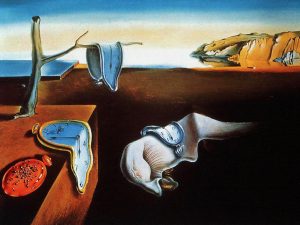with nothing in mind
Forty-five years ago television viewers were reminded that “a mind is a terrible thing to waste”[1] and although that public service announcement is no longer around, the message it conveyed and the sentiment it evoked remain as true today as it did at the time. There is nothing quite as tragic as when something as incredibly complex and capable as the mind is laid waste or obtunded through neglect, moral turpitude, intoxication, stupor, or indifference on the part of the one who lacks the will to use and care for that which God has so freely given.

Persistence of Memory – Salvidor Dali
There is a caveat to be considered which must be mentioned here; a need to look beyond what has been so profoundly trampled and laid waste by one’s own choices, one’s own actions or inactions as might prove the case. While no doubt there are those who, through some congenital defect of mind, are incapable of benefiting from it to its fullest, those cases are among the unfortunate few.
And yet, far too many of us are or have been carelessly wasting our precious gift of mind in the pursuit of mindless pleasures, wanting nothing more than to feel or think of not much at all. What clouded thought does, with infrequency, appear as a thing desired, is with increasing regularity conceived as a right to own some insubstantial pleasure or to give release from some momentary discomfort.
And one must or ought to ask both why and how have so many minds been laid to waste? To whom should the blame for such tragedy rest? I suggest that the darkest, most contemptible abuse of the human mind must rightly be laid squarely upon those to whom such innocent and malleable minds were entrusted to be well-formed and yet were so intentionally and vacuously malformed and laid to waste.
For far too long we have been inculcated with the false narrative, first proposed by Thomas Hobbes, that there is no good or evil, there is only the human will that wants what it desires; that all we desire that pleases is good and what does not is evil. As long as what I desire does not infringe on your desire and vice-versa, we have the right to each our own. Each and every individual view is equally legitimate and equally allowable. This is the premise of moral relativism and moral relativism is what lays waste to the mind.
One has to look no further that the grand halls of higher education to discover examples of such depraved instruction. The very notion of “safe zones” and protection from offensive speech on campuses ought to be offensive to any student enrolled for the express purpose of actually acquiring an education, in discovering the truth. To this point John Piper writes that “the mind was designed not to defend what we want, but to discover what is ultimately true, which should shape our wants and satisfy them more deeply with God. The purpose of the mind is not to rationalize subjective preferences, but to recognize objective reality and to help the heart revel in God.” [2]
One final thought: “A book without words is a mind without thought.”[3]
[1] Motto adopted by the United Negro College Fund.
[2] John Piper, The Pleasures of God: Meditations on God’s Delight in Being God.
[3] Catherine Forbes.
